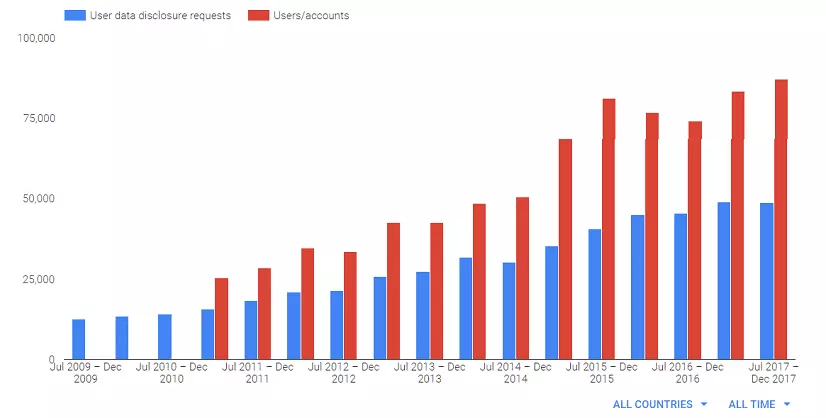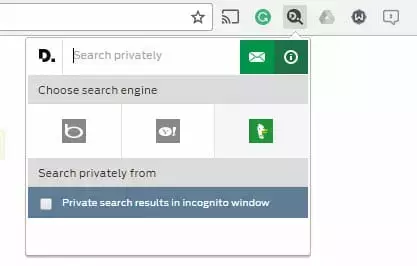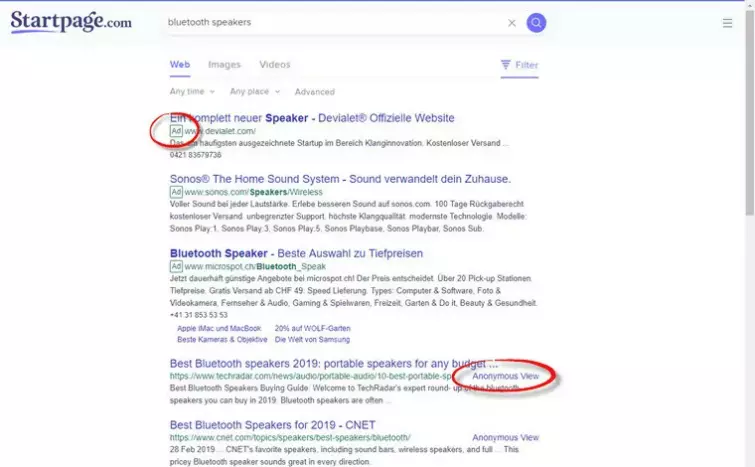These are the privacy search engines we recommend
Using a private search engine such as StartPage or DuckDuckGo is becoming ever more important. Many privacy focused alternatives usually leverage the big search engines in order to return results, but proxy search requests so that Google, Yahoo or Microsoft do not know who did the search. In other words, they only see that the query was searched for, not the indvidual who searched for it.
These privacy search engines promise not to log your IP address or any searches you make, unlike Google and the other search engine giants. If you want the benefits of rapid access to information that a search engine provides without giving up your privacy, read on.
What Does Google Know About Me?
The problem with most search engines is that they spy on you. This is their business model – to learn as much about you as possible, to deliver highly targeted advertising directly to your browser window.
Google has even recently dropped its moratorium on combining what it learns by scanning your emails with what it learns about you through your searches. All the better to spy on you. Information typically collected and stored each time you make a search includes:
- Your IP address
- The date and time that you made the query
- The query search terms
- A cookie ID
A cookie is deposited in your browser’s cookie folder that uniquely identifies your computer. With it, a search engine provider can trace a search request back to your computer.
This information is usually transmitted to the requested web page, and to the owners of any third party advertising banners displayed on that page. As a result, as you surf the internet, advertisers can build up a (potentially highly embarrassing) profile of you.
Of course, if Google, Microsoft, and Yahoo!, etc., know lots about you, this information can be (and often is) handed over to the police and the NSA. If you find this worrying, it's a good sign that you should consider a Google alternative.
Indeed, it was only recently that evidence emerged showing how closely Yahoo works with the NSA to betray its users to the intelligence service. Naughty, naughty. Using a VPN in the USA, or any other country involved in the five eyes alliance is a great way to avoid spying from the NSA.

Google Transparency Report on the number of User Data Requests received, and the number (at least partially) acceded to.
The filter bubble: what the internet is hiding from you
An added benefit of using a search engine that does not track you is that it avoids the "filter bubble" effect. Most search engines use your past search terms (and things you "Like" on social networks) to profile you. They can then return results they think will interest you.
This can result in only receiving search returns that agree with your point of view, and this locks you into a "filter bubble", where you do not get to see alternative viewpoints and opinions because they have been downgraded in your search results.
Not only does this deny you access to the rich texture and multiplicity of human input, but it can also be hazardous as it can confirm prejudices, and prevent you from seeing the "bigger picture".
The Best Private Search Engines
In a world governed by tracking, DuckDuckGo promises to uphold your privacy! DuckDuckGo is “The Search Engine that Vows Not to Track You”. Gabriel Weinberg, the CEO and founder of DuckDuckGo, has stated that “if the FBI comes to us, we have nothing to tie back to you.” It is a US-based company and is the most popular and high-profile of the privacy search engines. Searches are primarily sourced via Yahoo, with whom DuckDuckGo has a strong relationship. This is very worrying given recent revelations about its ties to the NSA, but DuckDuckGo continues to promise that it does not collect or share personal information. Here we can see both the contextual filter in actual (auto-direct to Products) and DDG's discrete ads DuckDuckGo displays ads alongside its search results. These are sourced from Yahoo as part of the Yahoo-Microsoft search alliance. By default, when advertisers sign up for a Bing Ads account, their ads automatically enter rotation into all of Bing’s distribution channels, including DuckDuckGo. Importantly, however, these ads are untargeted (they are displayed based on your search terms). And as already noted, they are clearly marked and are shown separately from the “pure” search returns. DuckDuckGo is part of the affiliate programs of Amazon and eBay. When you visit those sites through DuckDuckGo and subsequently make a purchase, it receives a small commission. No personally identifiable information is given out in this way, however, and this does not influence search result rankings. DuckDuckGo states that it does not collect or share personal information. Gabriel Weinberg, CEO of DuckDuckGo, has contacted me regarding this article, attempting to once again reassure us that DuckDuckGo is privacy-conscious and retains no data. In addition to its rather nifty contextual filters, the most striking feature of DuckDuckGo is "bangs". These allow you to search other websites quickly and easily. For example, typing !guk before a search query will return Google UK search results, and typing !a will search the Amazon store for you. Note that bangs take you to the website in question. The searches are not proxied, so you lose an element of privacy if you bang Google directly. Fortunately, there is a solution. You can combine bangs with Startpage.com (see review in this list) by typing !s or !sp, and because Startpage.com uses Google, you can have the best of both worlds. DuckDuckGo offers good looking and easy-to-use interface, although some may prefer Google to the primarily Yahoo-based search results. Bangs are a killer feature, however, and one that goes a long way towards compensating for this issue. Just remember that if you want to query Google and protect your privacy, it makes sense to bang into StartPage.com with the !s or !sp for Google search results in privacy instead of going to Google directly. It is little surprise, then, that DuckDuckGo is so popular. But the fact that it is a US company should sound a note of caution. SearX is versatile with public and self-hosted options - the latter of which is unrivalled in privacy Less well-known, but fast gaining traction with the security community is SearX. Not only is SearX fully open-source, but it is easy to set up and to run your own instance of it. There is an official public SearX instance, or you can use one of many volunteer-run public instances. But what SearX is really about is running your own instance. This makes SearX the only metasearch engine where you can be 100 percent sure that no logs are kept! There are no ads, search suggestions are listed to the right, and as with Startpage, you can proxy webpages. SearX is an open-source project run by volunteers. On the official instance, there is no on-site advertising and no affiliate marketing. Because it is open-source, individual operators of public SearX instances are free to introduce their own finance models. But I have yet to find a single instance that is not 100 percent ad and affiliate-free. As with Startpage, the ability to proxy websites is a killer feature if you can live with it breaking many websites that you visit. For serious tech-savvy privacy-heads, a self-hosted SearX instance is the way to go. Simply put, nothing else is in the same league when it comes to knowing for certain that your searches are not logged. More casual users may also be surprised at how well the software works on public instances. My personal feelings are that these are much less likely to log your searches or be spied on by the US and other governments than DuckDuckGo, Startpage or Disconnect. But this is purely speculation. Disconnect attempts to cater to all your security needs - from VPNs to browser extensions The US-based company has made a name for itself with some excellent open-source privacy-oriented browser extensions in recent years. One of these is the open-source Disconnect Search add-on for Firefox and Chrome (a non-open source Android app is also available). This browser add-on is still the primary way to use Disconnect Search, although a JavaScript web app is available. This mimics the browser extension and allows you to perform web searches from the Disconnect Search web page. Disconnect also markets a Premium VPN and online security app, with Disconnect Search functionality built-in. Please see my Disconnect VPN review for more details on this. The browser extension Disconnect markets a Premium product, but the Disconnect Search browser extension is free. It hides your IP when doing searches but then sends you directly to the selected search engine. This means that Disconnect performs no advertising or affiliate marketing of its own when doing a search. The Disconnect Search browser extension provides a quick and easy way to hide your true identity while doing searches using your favorite search engine. The fact that Disconnect is US-based, however, is a major issue. Based in the Netherlands, StartPage enjoys strong privacy laws unlike its US competitors! Startpage.com and Ixquick are run by the same company. In the past, Startpage.com returned Google results, while Ixquick returned results from a number of other search engines, but not Google. The two services have now been combined, and both return identical Google results. Although no longer actively supported, the old Ixquick metasearch engine is still available at Ixquick.eu. Interestingly, despite no longer being actively supported, Startpage.com has recently removed Yahoo results from the legacy search engine. This is in response to news that Yahoo has been helping the NSA spy on its users. Ads are discrete but clearly labeled Much like DuckDuckGo, Startpage.com makes money from ads and affiliate links. These ads are untargeted, clearly marked, and not mixed in with the “real” search returns. They are somewhat more prominently displayed than with DuckDuckGo, however. Startpage.com’s killer feature is that, rather than visiting a website directly, you can proxy the connection. If you select this option, then a proxy server run by Startpage.com sits between your computer and the website. This prevents the website from knowing your true IP address (much like a VPN), and from being able to use web tracking and fingerprinting technologies to identify and track you. It also blocks malicious scripts. The downside is that pages load more slowly since StartPage.com must retrieve the contents and re-display them. That said, the newly re-branded and redesigned "Anonymous View" is much faster than was previously the case. It also breaks websites much less because it allows JavaScript "while rewriting and 'redefining' JavaScript primitives to protect your privacy." I must say that this is a terrific feature and one that can significantly improve your privacy. Given its downside, however, you probably won’t want to use it all the time. With its new re-design, StartPage.com matches DuckDuckGo in terms of prettiness and user-friendliness. But thanks to being based in the Netherlands and having nothing to do with Yahoo, it should be more resistant to NSA spying than its US-based rival (if you specify non-US servers!). And the ability to proxy web pages is an absolute doozy. Update: As of November 2019 we have depreciated StartPage in this article. The reason for this is that it has been purchased by System1, a company which "has developed a pre-targeting platform that identifies and unlocks consumer intent across channels including social, native, email, search, market research and lead generation rather than relying solely on what consumers enter into search boxes." Our thanks to former StartPage employee Liz McKintyre for alerting us to this development. Peekier brings welcome changes to the standardized search engine. Peekier is a new no-logs search engine. There is not enough information about this service currently available for me to give it a proper assessment. It is worth mentioning, however, because of the attractive and innovative way that it displays search results. In a field were where, if we are honest, most search engines look pretty similar, it is great to see a different approach. I, therefore, think it worth flagging up Peekier and keeping an eye on the service to see how it develops. 1. DuckDuckGo
Search results

How it makes money
Privacy
Features
Overall
Search results

How it makes money
Privacy
Features
Overall
Search results

How it makes money
Privacy
Overall
Search results

How it makes money
Privacy
Features
Overall

Privacy Search Engines Conclusion
Using any of these services engines will significantly improve your search privacy. Crucially, your searches will not be recorded to help build a profile that is used to sell you stuff. All the search engines I looked at in this article are easy to use and return good results.
Will these services protect your searches from government surveillance (and the NSA in particular)? In the case of US companies, it is safest to assume not. But unless you are doing something very illegal, this may not concern you (although it should).
Startpage is non-US based, has been independently audited, and allows you to access websites with a great deal of privacy thanks to its proxy feature. It is, therefore, a much better choice for privacy-heads than DuckDuckGo.
Public SearX instances are less likely to be monitored than other higher-profile search engines, but they may be. It is also likely that you will know nothing about their operators. Running your own SearX instance on hardware directly under your control, however, is an extremely secure and private solution. And is therefore only one that I can recommend to serious privacy fanatics.
The fact the SearX has a great interface and returns on-the-button results from all the major search engines is the icing on the cake.
A note on Start Page
Please note, since this page was first written, Start Page has been acquired by the Privacy One Group, leading to some concerns around the levels of privacy that it can offer. Since then, many concerns have been alleviated but we will continue to monitor the situation closely.





